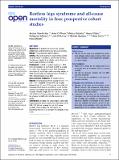| dc.contributor.author | Szentkirályi, András | |
| dc.contributor.author | Winter, Anke C | |
| dc.contributor.author | Schürks, Markus | |
| dc.contributor.author | Völzke, Henry | |
| dc.contributor.author | Hoffmann, Wolfgang | |
| dc.contributor.author | Buring, Julie Elizabeth | |
| dc.contributor.author | Gaziano, John Michael | |
| dc.contributor.author | Kurth, Tobias | |
| dc.contributor.author | Berger, Klaus | |
| dc.date.accessioned | 2013-10-16T18:03:36Z | |
| dc.date.issued | 2012 | |
| dc.identifier.citation | Szentkirályi, András, Anke C. Winter, Markus Schürks, Henry Völzke, Wolfgang Hoffmann, Julie E. Buring, J. Michael Gaziano, Tobias Kurth, and Klaus Berger. 2012. Restless legs syndrome and all-cause mortality in four prospective cohort studies. BMJ Open 2(6): e001652. | en_US |
| dc.identifier.issn | 2044-6055 | en_US |
| dc.identifier.uri | http://nrs.harvard.edu/urn-3:HUL.InstRepos:11179042 | |
| dc.description.abstract | Objectives: To evaluate the association between restless legs syndrome (RLS) and all-cause mortality. Design: Four prospective cohort studies. Setting: The Dortmund Health Study (DHS) and the Study of Health in Pomerania (SHIP) from Germany. The Women's Health Study (WHS) and the Physicians’ Health Study (PHS) from the USA. Participants: In DHS: a random sample (n=1 299) from the population of Dortmund; in SHIP: a sample (n=4 291) from residents living in West Pomerania were drawn by multistage random sampling design; in WHS: female healthcare professionals (n=31 370); in PHS: male physicians (n=22 926) Main outcome measures: All-cause mortality. Results: The prevalence of RLS ranged between 7.4% and 11.9% at baseline. During follow-up (ranging between 6 and 11 years) RLS was not associated with increased risk of all-cause mortality in any of the four cohorts. The multivariable-adjusted HRs (95% CI) for all-cause mortality ranged from 0.21 (0.03 to 1.53) to 1.07 (0.93 to 1.23) across the four studies. The HRs for all-cause mortality did not differ according to gender. Conclusions: In these four independently conducted large prospective cohort studies from Germany and the USA, RLS did not increase the risk of all-cause mortality. These findings do not support the hypothesis that RLS is a risk factor for mortality of any cause. | en_US |
| dc.language.iso | en_US | en_US |
| dc.publisher | BMJ Group | en_US |
| dc.relation.isversionof | doi:10.1136/bmjopen-2012-001652 | en_US |
| dc.relation.hasversion | http://www.ncbi.nlm.nih.gov/pmc/articles/PMC3533015/pdf/ | en_US |
| dash.license | LAA | |
| dc.subject | restless legs sydrome | en_US |
| dc.subject | prospective cohort study | en_US |
| dc.subject | mortality | en_US |
| dc.title | Restless Legs Syndrome and All-Cause Mortality in Four Prospective Cohort Studies | en_US |
| dc.type | Journal Article | en_US |
| dc.description.version | Version of Record | en_US |
| dc.relation.journal | BMJ Open | en_US |
| dash.depositing.author | Gaziano, John Michael | |
| dc.date.available | 2013-10-16T18:03:36Z | |
| dc.identifier.doi | 10.1136/bmjopen-2012-001652 | * |
| dash.contributor.affiliated | Kurth, Tobias | |
| dash.contributor.affiliated | Gaziano, John | |
| dash.contributor.affiliated | Buring, Julie | |


